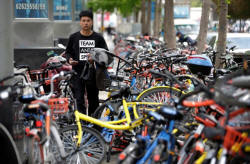|
The country has seen a wave of iconic, brightly colored shared
bicycles hits its city streets over the last year, helping
revolutionize urban travel, but also drawing some public ire
over mountains of bike clogging up sidewalks.
The chief executive of Bluegogo said in a public letter posted
online he had "made mistakes" and the firm was winding up. He
apologized to investors, partners and 20 million registered
users of the company's 600,000 bikes.
"We fought until the very last and I believe we can all leave
with pride and our heads held high," Li Gang wrote, adding he
had endured months of sleepless nights.
He said financing in the market had become a "bubble".
China's bike sharing craze has been driven by huge investments,
especially into the two market leaders Mobike and Ofo, which
have raised billions of dollars from tech giants like Tencent
Holdings <0700.HK> and Alibaba Group Holding Ltd <BABA.N>.
The two brands - often seen as China's "Uber for bikes" - have
deployed millions of bicycles around the country, and pushed
overseas into markets in the United States and Europe.
The trend hasn't been without its opponents. Regulators have
tightened rules around shared bikes and raised concerns too many
bikes were hitting the streets. Some cities have put bans on
shared bikes, citing safety concerns.
(Reporting by Adam Jourdan; Editing by Edmund Blair)
[© 2017 Thomson Reuters. All rights
reserved.] Copyright 2017 Reuters. All rights reserved. This material may not be published,
broadcast, rewritten or redistributed.
 |
|




